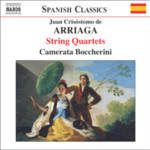
Arriaga: Complete String Quartets
 $25.00
Out of Stock
$25.00
Out of Stock6+ weeks add to cart
JUAN CRISOSTOMO ARRIAGA
Arriaga: Complete String Quartets
Camerata Boccherini
[ Naxos Spanish Classics / CD ]
Release Date: Thursday 26 January 2006
This item is currently out of stock. It may take 6 or more weeks to obtain from when you place your order as this is a specialist product.
"This is a wonderfully presented, recorded and performed release which is a must for chamber music lovers."
(MusicWeb Feb 2006)
Interest in the music of Juan Crisóstomo de Arriaga began to revive in the late nineteenth century. Since then, his works have earned the admiration of the music world, confirming the fact that his premature death meant the loss not only of an individually brilliant composer, but also perhaps of a significant link in the development of musical history itself.
Arriaga was born in Bilbao on 27th January 1806 and soon became renowned in the city's musical circles. His earliest compositions include the divertimento Nada y mucho (1817), the Overture for nonet, Op. 1, and the two-act opera Los esclavos felices (The Happy Slaves), which was completed in 1819 and first performed to great acclaim in Bilbao a year later. That same year Arriaga wrote the Tema variado en cuarteto, Op. 17, and La húngara, a theme and variations for violin and ad libitum bass.
In 1821 he moved to Paris, where he studied the violin with Pierre Baillot and composition with François-Joseph Fétis. He put in very long hours, working both as a performer and as Fétis's teaching assistant in his counterpoint and fugue classes. The great majority of his extant works date from his time in Paris: three string quartets, a number of stage works such as Agar and Erminia, the Symphony and the Three Studies or Caprices for piano. His excessive workload is the most probable cause of the pulmonary infection that led to his death in 1826.
Arriaga's three string quartets were published in Paris
Tracks:
String Quartet No. 1 in D minor
String Quartet No. 2 in A major
String Quartet No. 3 in E flat major



